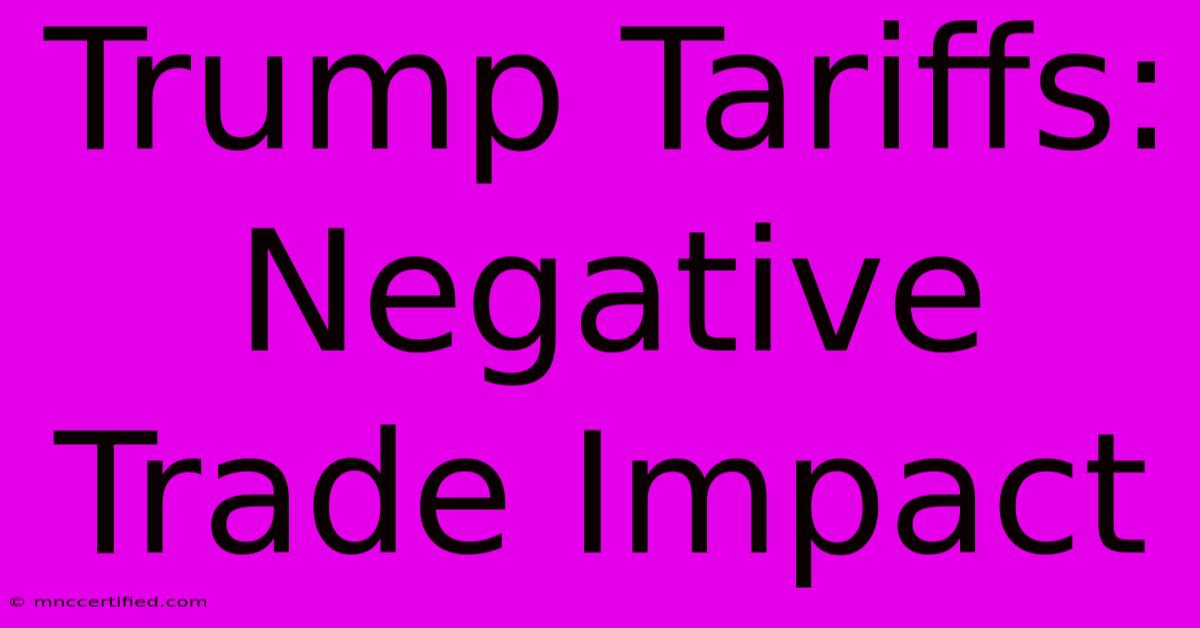Trump Tariffs: Negative Trade Impact

Table of Contents
Trump Tariffs: A Negative Impact on Global Trade?
The Trump administration's imposition of tariffs on various goods sparked considerable debate about their economic consequences. While proponents argued these tariffs protected American industries and jobs, many economists and trade experts pointed to significant negative impacts on global trade. This article delves into the detrimental effects of these tariffs, examining their ripple effects across various sectors and the broader global economy.
The Core Argument Against Trump Tariffs
The fundamental criticism of the Trump tariffs centers on their violation of basic economic principles. Tariffs, essentially taxes on imported goods, artificially inflate prices, reduce consumer choice, and disrupt established supply chains. This ultimately harms both consumers and businesses. Instead of fostering domestic growth, they often lead to trade wars, retaliatory tariffs, and a slowdown in global economic activity.
Increased Prices for Consumers
One of the most immediate consequences of tariffs is higher prices for consumers. When tariffs are placed on imported goods, the cost of those goods increases, directly impacting consumers' purchasing power. This is particularly true for goods that are not readily available domestically or where domestic alternatives are significantly more expensive. This price hike disproportionately affects low-income households, further exacerbating income inequality.
Disrupted Supply Chains and Reduced Efficiency
Global supply chains are complex networks built on efficiency and specialization. Tariffs disrupt these networks by making imports more expensive and less attractive. Businesses may be forced to switch to more expensive domestic suppliers, leading to increased production costs and reduced competitiveness. This inefficiency ultimately harms the overall economy. The disruption of global supply chains has been cited as a major factor contributing to inflation in recent years.
Retaliatory Tariffs and Trade Wars
A key consequence of imposing tariffs is the risk of retaliation from other countries. When one country imposes tariffs, it's common for other countries to respond in kind, leading to a trade war. These trade wars escalate tensions, disrupt trade flows significantly, and negatively impact global economic growth. The Trump-era trade war with China, for example, demonstrated the destructive potential of such actions.
Sector-Specific Impacts of Trump Tariffs
The impact of Trump tariffs wasn't uniform across all sectors. Some industries experienced temporary benefits, while others suffered significant losses.
Agriculture: A Heavily Impacted Sector
The agricultural sector felt the brunt of retaliatory tariffs imposed by countries like China. Farmers faced reduced export markets and lower incomes, leading to financial hardship and impacting rural communities. The decline in agricultural exports under the Trump tariffs highlighted the vulnerability of this sector to trade disputes.
Manufacturing: Mixed Results but Overall Negative Impact
While some manufacturing sectors might have seen short-term gains from protectionist measures, the overall impact on manufacturing was negative. The increased cost of imported inputs and the disruption of supply chains undermined competitiveness and hindered growth in the long run. Many manufacturers struggled to adjust to the new trade landscape, leading to job losses in certain sectors.
The Long-Term Economic Consequences
The long-term effects of Trump's tariffs continue to be felt today. The disruption to global trade flows, the rise in prices, and the uncertainty created by protectionist policies have had a lasting negative impact on economic growth and international cooperation. The increased inflation and the slowdown in global economic activity can be partly attributed to the trade conflicts that intensified during this period.
Conclusion: A Case for Free Trade
The economic consequences of the Trump tariffs demonstrate the importance of free trade and the negative impact of protectionist measures. While some industries may experience temporary benefits, the overall effect is usually detrimental, leading to higher prices, reduced efficiency, and disrupted global supply chains. A commitment to free and fair trade remains crucial for fostering global economic growth and prosperity. The experience of the Trump tariffs serves as a cautionary tale for policymakers considering similar protectionist strategies in the future.

Thank you for visiting our website wich cover about Trump Tariffs: Negative Trade Impact. We hope the information provided has been useful to you. Feel free to contact us if you have any questions or need further assistance. See you next time and dont miss to bookmark.
Featured Posts
-
Rod Stewart Opens Glastonbury 2024
Nov 27, 2024
-
Arsenal Injuries Artetas Positive News
Nov 27, 2024
-
Zim Vs Pak Highlights 10 Run Pakistan Win
Nov 27, 2024
-
Real Estate Investor Insurance
Nov 27, 2024
-
Elizabeth Line Rush Hour Train Chaos
Nov 27, 2024